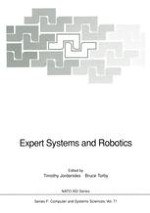1991 | OriginalPaper | Buchkapitel
Intelligent Cooperation for Robotics
verfasst von : Eugénio Oliveira, Rui F. Silva, Carlos Ramos
Erschienen in: Expert Systems and Robotics
Verlag: Springer Berlin Heidelberg
Enthalten in: Professional Book Archive
Aktivieren Sie unsere intelligente Suche, um passende Fachinhalte oder Patente zu finden.
Wählen Sie Textabschnitte aus um mit Künstlicher Intelligenz passenden Patente zu finden. powered by
Markieren Sie Textabschnitte, um KI-gestützt weitere passende Inhalte zu finden. powered by
The use of Multi Agent Systems as a Distributed Artificial Intelligence paradigm for Robotics is the principal aim of our present work. In order to make different Intelligent Systems to cooperate in solving non trivial tasks, special architectures need to be designed. New functionalities are attached to each particular Agent suitable for Robotics, enabling cooperation at the Knowledge and Intelligence Levels.Each Agent is implemented by means of a set of different specialized processes. Besides the Intelligent Systems itself, a Monitor, an Acquaintance plus Self-knowledge Modules and a Communication Module, are fundamental modules that make it possible for different Agents to cooperate by exchanging competences, information and results. Which kind of knowledge to represent, either static or dynamic, involving the overall system, how to represent it, to share it, to maintain it and to infer upon it are subjects that have been adressed and several conclusions have already been drawn. An Assembly Robotics testbed is being used for that purpose, and several Intelligent Agents developed such as: An High Level Planner, a World Descriptor and an Object Identifier.Each one of these Intelligent Systems, incorporating its own reasoning capabilities (therefore considered as Scmi-autonomous Agents), has been enhanced with several modules according to the previously referred architecture. We claim Robotics to be a good example for Intelligent Systems cooperation and we intend to apply the aforementioned principles to different classes of Robotics applications.
